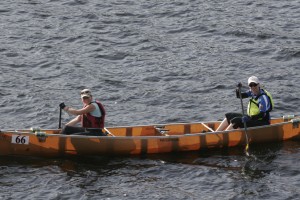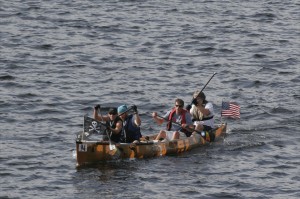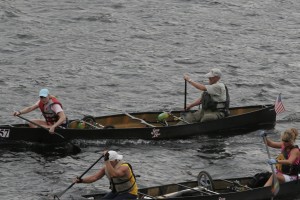High winds hamper paddler quests to complete 90-Miler race
We had some rain from all the storms that blew through here last week but it was not enough to bring my pond up even a tad.
We were out chasing Loons on Putnam Pond last Thursday night after one of the storm systems blew through.
While we were there a storm went by to the north. It seemed to linger in one place over in Vermont for over an hour.
It put on a light show brighter than a fireworks display.
Earlier in the week a storm dumped over six inches of rain in one place in Vermont which caused some flooding.
We only got about an inch-and-a-half that day, and only a half-inch from the cold front that went through on Friday night.
There was a lot more wind than rain in that storm, as many of the racers in the 90-Miler Classic Canoe Race can attest to.
Bob Zimmerman and his daughter Julie were at the far end of Long Lake on Saturday in what he said were four to five foot waves.
He said they rode up right up into the air on two big waves and managed to stay inside the boat.
But when a third wave hit, the canoe blew right out from under them and was literally blown away.
Bob said they were in the water for over an hour-and-a-half. Luckily the water was warmer than it normally is this time of year.Sherri Grimm, Barb Getty, Patty Foley and Linda Frank got dumped at the end of Long Lake and pulled out for the rest of the race that day.
They finished the last leg of the race on Sunday.
Diane Waters of Long Lake got dumped twice in her kayak at the end of Long Lake but stayed in the race until Axton Landing that day. She didn’t say if she finished the race the next day or not.
Amy Sauer and her sister Lynee’ went up the right side of Long Lake to the end where they waited for over half-an-hour before hitting the big waves going into the Raquette River at the end of the lake.
They made it without a dumping. She said it was exciting for a while trying to keep the canoe straight in the wind and waves.
Rich Nelson and his crew of three made it through the big waves into the river, as did Rev. Lawrence Bartel in his one-man canoe.
Maybe race officials will make a different decision if those types of conditions occur again.
I remember having to make the decision to call the race at the Brown’s Tract Stream Bridge a few years back when I was a Forest Ranger. That’s when the race went to north end of Raquette Lake.
We had over 25 canoes capsized in the lake and we didn’t need to see any more. Some of the racers were very upset. But I would rather have them upset than hypothermic—or even worse—as the water was much colder that year.
I had some time on the water this week but it was night time trying to catch Loons. Monday night we were on First and Second Lakes until nearly 3 a.m.
We managed to catch a chick and an adult female on First Lake but the male never got closer than 100 feet from the boat.
The female is now wearing bands and a geo-locater. This device will follow her movements for a couple years.
It’s no larger than your fingernail and is glued to one of her plastic leg bands. She has to be recaptured in two years to download the information. If she has chicks it is very likely to happen.
Trying to catch Loons at this time of year—when the chicks are as big as they are—is difficult because they aren’t as attached to the chicks as they are when they are younger.
As I mentioned previously, we were on Putnam Pond for about three hours last Thursday night and never heard or saw a Loon, even though a chick and an adult were seen on the lake in the afternoon.
On Friday night our first stop was Upper St. Regis Lake. From dusk until about midnight we went all the way around two territories on the lake.
We located one adult that wouldn’t hold for the light. I had a shot at a big chick, which I had about half-way into the net before it escaped, never to be seen again.
We heard the adults a few times but they wouldn’t stay up when we put the light them.
We traveled north to Clear Pond by Mecham Lake where we were on the water until about 3 a.m.
For the first hour we never heard or saw a Loon.
Finally one called so we knew they were there. We never got either of those birds in our light, but we did see the big chick a few times.
It never gave us a net shot so that ended our Loon captures for this year.
Most of the Deer have already put on their dark brown coats for the winter. Maybe they know something that we don’t. The Farmer’s Almanac says it’s going to be a long cold snowy winter, but only time will tell.
Early Bear Season starts Saturday. Be aware while you are out and about, but that’s another story. See ya.



